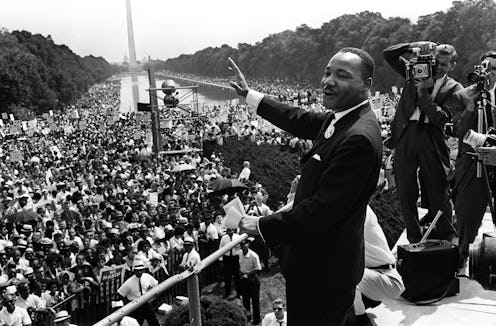News
MLK's Legacy Is Not For Political Propaganda
As Americans pull on their yoga pants for a free Monday on which to commemorate one of the country's most influential civil rights leader, many politicians are dusting off tired old myths regarding Martin Luther King, Jr.'s political affiliation to invoke his name and memory for their own personal political gain. Filing King away as a supporter of either political party might seem harmless, but in essence, it turns the African-American civil rights leader into a widely-distorted propaganda tool, and diminishes the true impact of his work and legacy. But first, let's address the question head-on: Was Martin Luther King Jr. a Democrat or a Republican? The answer is "Neither."
Aware of the influence he had as a leader and the necessity of both parties to bring about social and political reform, King made a conscious effort to maintain a bipartisan position in politics, and did not officially endorse any presidential candidates during his lifetime. Unfortunately, his wish to remain a figurehead of bipartisanship has not followed him into the afterlife, as modern-day politicians play tug of war with his name.
Republicans have repeatedly claimed King as one of their own, going so far as to use his name on billboards aimed at wooing black voters. PolitiFact has countered the statement not once, but twice.
Republicans' belief that King was a card-carrying supporter of theirs can be traced to Dr. Alveda King, a niece of the late civil rights leader. In a video allegedly filmed in 2008 for the National Black Republican Association, Alveda urged voters to follow in her uncle's footsteps by voting Republican in the year's presidential election:
I just want to share with you a little bit about my family and my history. My uncle Dr. Martin Luther King Jr. during his lifetime was a Republican, as was my father, his brother, Rev. A. D. King, and my grandfather, Dr. Martin Luther King Sr. The Republican party historically has supported the rights of the oppressed.
In 2011, the fact-check monitor sought to correct that myth, and cited a statement from Steve Klein, the communications director of the King Center in Atlanta in 2008, as well as an excerpt from the autobiography of King's wife, Coretta Scott King, which both assert that the activist never confirmed he was a Republican, but instead purposefully tried not to identify with either party. PolitiFact also cited an Associated Press interview with King's son, Martin Luther King III, in which he speaks out against the GOP's use of his father as political propaganda:
It is disingenuous to imply that my father was a Republican. He never endorsed any presidential candidate, and there is certainly no evidence that he ever even voted for a Republican. It is even more outrageous to suggest that he would support the Republican Party of today, which has spent so much time and effort trying to suppress African American votes in Florida and many other states.
Roughly a year later, the Tennessee arm of PolitiFact was tackling the myth, after a Republican Congressional candidate paid for a billboard declaring, "Martin Luther King Jr. Was A Republican. So Is Charlotte Bergmann. Charlotte Bergmann for Congress" to be put up near Memphis. This time, PolitiFact cited two excerpts from King's autobiography. In the first, King said he lacked an affiliation "in order to maintain a bipartisan posture, which I have followed all along in order to be able to look objectively at both parties at all times." In the second excerpt, King tells a supporter "in the past, I always voted the Democratic ticket" in a letter written in 1956.
And yet, despite serious evidence contradicting them, Republicans continue to claim ownership over Dr. King's political leanings. Even worse, the declaration that "Dr. King was a Republican" has become a poor tradition of commemoration on Martin Luther King, Jr. Day among politicians who ignore the fact that the GOP of today has vastly different policies than the GOP of Dr. King's era.
While Democrats have not rolled out campaigns advertising King to be a registered Democrat, his name and image have been invoked in significant and strategic ways by President Barack Obama, and more recently Bernie Sanders, as a means of connecting with voters. In announcing his executive action on gun control on Jan. 5, Obama quoted King, as if to imply the late activist would have backed his policy decision.
It's nearly impossible to say today where King's support would fall, as circumstances have changed since the civil he was alive. But it is known that King owned multiple guns, and at one point applied for a concealed carry permit. Democratic presidential candidate Sen. Bernie Sanders has never said that he believes King, whom he saw speak at the historic 1963 March on Washington, would advocate for his presidential campaign. But some of his supporters do. For example, rapper Killer Mike:
Look at their policies, look at their philosophies. Look at that picture of Dr. King that’s been on your grandma’s wall for your whole life, and say to yourself: Whose policies best identify with that that? In my case, that’s Senator Sanders.
In many ways, in the hands of historians and politicians alike, Dr. King has become an over-paraphrased and often-exploited brand. His life's work and political opinions have been watered down to nonviolence and desegregation. In clouding the memory of King with misinformation — whether intentionally or out of ignorance — and riding the coattails of his legacy, his hard work and tireless fight for equality has been denigrated. And it is for this reason that the #ReclaimMLK movement is urging for Dr. King's legacy be taken back from "efforts to soften, sanitize, and commercialize it," or efforts to "reduce a long history marred with the blood of countless people into iconic images of men in suits behind pulpits."
